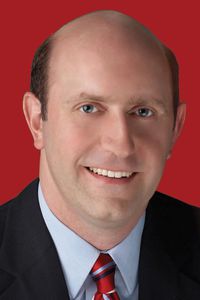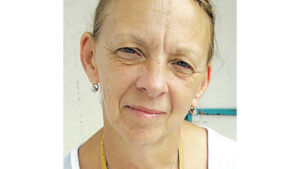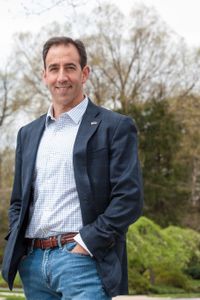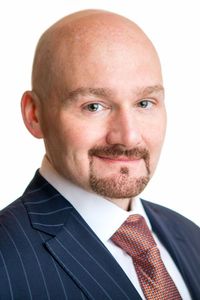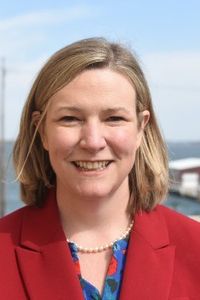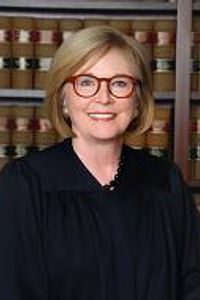Michael LaPaglia
Michael LaPaglia may not be a household name in North Carolina politics, but his two campaigns for Secretary of State offer insights into the evolution of the NC Republican Party. While LaPaglia struggled to gain traction in two Republican primaries, his messaging and positioning provide a window into a conservative outsider seeking elected office.
Small Town Beginnings
Michael LaPaglia was born on March 19, 1972 in the small town of Davidson, North Carolina. Located just north of Charlotte, Davidson provided LaPaglia with small town roots and southern values. He attended Davidson Day High School, where he was an honors student and member of the debate team.
LaPaglia left Davidson in 1990 to attend Emory University in Atlanta, Georgia. He graduated in 1994 with a Bachelor of Arts degree in Political Science. LaPaglia continued his education at the University of North Carolina Chapel Hill, receiving a Master of Fine Arts in Theatre in 1999.
Finding His Place in the Business World
After completing his masters degree, LaPaglia returned to Charlotte and began working at LaPaglia & Associates, a consulting firm started by his father. He quickly moved up the ranks, becoming Vice President in 1998 and then CEO in 2008.
LaPaglia used his background in political science to provide clients with guidance on strategic planning, corporate communications, and regulatory issues. Under his leadership, LaPaglia & Associates expanded its client base and became a fixture in Charlotte’s business community.
The Leap into Politics
While building his career in the private sector, LaPaglia developed a passion for politics and public service. Prior to 2016, he had been involved with local Republican groups but had never run for office.
Sensing dissatisfaction among conservatives with the direction of the state government, LaPaglia decided to take the plunge into electoral politics. In February 2016, he filed paperwork to run as a Republican candidate for North Carolina Secretary of State.
LaPaglia’s central message focused on improving government accountability, transparency, and customer service. He also emphasized his business background as preparation for overseeing the department responsible for elections, corporations, and securities.
Battling for the 2016 Nomination
In the Republican primary, LaPaglia faced off against AJ Daoud, a young conservative activist. The primary quickly turned negative, with LaPaglia attacking Daoud’s lack of relevant experience.
Despite being the underdog, LaPaglia prevailed by emphasizing his managerial expertise and desire to reform the office. He won the March 2016 primary with 62% of the vote compared to 38% for Daoud.
Heading into the general election, LaPaglia faced an uphill battle against Democratic incumbent Elaine Marshall. First elected in 1996, Marshall was completing her fifth term as Secretary of State with high name recognition.
LaPaglia attempted to make the race about Marshall’s long tenure, arguing that new leadership was required to enact substantive reforms. However, Marshall’s strong connection with voters and fundraising advantage proved too much for LaPaglia to overcome.
In the November 2016 general election, Marshall defeated LaPaglia by a margin of 52% to 48%. While falling short of victory, LaPaglia had exceeded expectations by coming within fewer than 200,000 votes of unseating a long-time incumbent.
Gearing Up for Another Run
Following his loss in 2016, LaPaglia returned to running LaPaglia & Associates while remaining actively involved in Mecklenburg County Republican circles. He continued to advocate for the reforms he championed during his campaign.
Behind the scenes, LaPaglia started preparing for a rematch with Marshall in 2020. He believed his name recognition from the last election would give him an advantage in the Republican primary.
However, LaPaglia underestimated the strength of newcomer E.C. Sykes, who portrayed himself as more staunchly conservative. In the three-way March 2020 primary, Sykes defeated LaPaglia 43% to 19%, with businessman Chad Brown finishing third.
Messaging Focused on Integrity, Business, and Transparency
Throughout his campaigns, LaPaglia emphasized three main themes – election integrity, business development, and government transparency. He warned against the risks of voter fraud and advocated stricter voter ID laws.
As a businessman, LaPaglia argued he was best positioned to support job growth by cutting red tape and making it easier to start and operate a company in North Carolina.
LaPaglia repeatedly called for greater transparency in the Secretary of State’s office operations. He proposed new performance metrics and online tools to provide accountability to voters and businesses.
While these messages resonated with some Republican voters, LaPaglia struggled against primary opponents perceived as more conservative. Both Daoud and Sykes painted LaPaglia as an establishment moderate compared to their grassroots appeal.
Financing His Underdog Campaigns
As the underdog in both primaries, LaPaglia was at a significant fundraising disadvantage compared to his rivals. In the 2016 primary, he raised around $40,000 less than Daoud.
In 2020, LaPaglia’s total fundraising of less than $30,000 was dwarfed by the over $600,000 raised by Sykes. With limited resources, he was unable to mount an effective statewide campaign.
LaPaglia’s top donors were mainly individuals from his Charlotte business network. His largest expenditures went to campaign consulting, advertising, events, and travel costs. While he invested substantially in digital ads, LaPaglia lacked the budget for sustained TV and radio advertising.
The Difficulty of Gaining Traction as an Outsider
For his first two runs for elected office, LaPaglia took on the role of a political outsider challenging established candidates. While he offered a distinctive background in the private sector, he struggled to garner support and media coverage.
Against Daoud and Sykes, LaPaglia’s moderate profile compared to his opponents proved to be a liability in Republican primaries dominated by staunch conservatives. And as a first-time candidate in 2016, he found it difficult to stand out from Marshall’s incumbent advantage.
LaPaglia’s losses demonstrate the difficulties facing newcomers seeking to make inroads against experienced rivals with inherent name recognition advantages. Without strong pre-existing networks or eye-catching personas, underfunded underdogs often fail to excite voters or journalists.
Family and Faith Outside of Politics
While passionate about public service, LaPaglia has many pursuits outside of politics and business. He met his wife Susan while performing in a community theater production in Charlotte after moving back in 1999.
The LaPaglias have four children and are actively involved in their schools, sports teams, and extracurricular activities. Michael has coached his sons’ youth football and baseball teams for many years.
At Davidson United Methodist Church, where the LaPaglias have been longtime members, Michael serves on the finance committee. He also volunteers with Habitat for Humanity and leads an annual mission trip to repair homes in Appalachia.
Known for his singing talent, LaPaglia often performs at charity events and takes part in church musical productions. He co-founded an a cappella group at Emory that still reunites annually.
Weighing Another Run for Office
Despite two primary losses, LaPaglia remains open to running for elected office again in the future. In 2024, he may consider campaigning for a state legislative seat that would allow him to gain experience in Raleigh.
LaPaglia also may launch another bid for Secretary of State in 2028 or 2032, hoping that third time is the charm. However, he recognizes that the Republican Party primary electorate may continue trending away from his center-right positioning.
If LaPaglia concludes his political career, he plans to focus on expanding services at LaPaglia & Associates and may join corporate boards. His time on the campaign trail has enriched his passion for mentoring young people interested in public service.
Lasting Impact on North Carolina Politics
While unsuccessful in his bids for statewide office, LaPaglia brought attention to issues like transparency, good governance, and election integrity that remain salient for North Carolina voters across the political spectrum. His career serves as a model of an outsider working within the system to push for change.
LaPaglia also demonstrates the indispensable role of primaries in allowing parties to choose their standard-bearers. His losses show that Republican voters viewed other candidates as better reflecting their conservative values.
For future candidates, LaPaglia’s spirited underdog efforts provide an example of how to maximize limited resources and deliver campaign messages. Through tireless retail politics, he came closer than many anticipated to unseating a long-time incumbent in 2016.
The Winding Road of Political Ambition
Michael LaPaglia’s story illustrates the winding and uncertain road that many ambitious people take in pursuing elected office. After finding success in business, he felt called to public service but encountered tough intraparty competition.
While falling short in two Republican primaries, LaPaglia gained valuable experience in North Carolina politics. He developed campaign skills and built name recognition that could aid potential future runs.
Above all, LaPaglia’s cheerful persistence demonstrates that losses don’t have to spell the end of political dreams. As long as the passion for public service remains, there are always new opportunities ahead.
FAQ
Q: Where is Michael LaPaglia originally from?
A: LaPaglia grew up in the small town of Davidson, North Carolina located right outside of Charlotte. He attended Davidson Day High School before leaving for college.
Q: What were some of LaPaglia’s main campaign messages?
A: LaPaglia focused on issues like election integrity, business development, and government transparency. He touted his private sector experience and called for increased accountability.
Q: How much fundraising did LaPaglia’s campaigns generate?
A: LaPaglia raised around $40,000 for his 2016 primary and $30,000 for the 2020 primary. He was significantly outraised both times by his opponents.
Q: Why did LaPaglia lose his two Republican primary races?
A: LaPaglia struggled as a political outsider against opponents viewed as more staunchly conservative by GOP primary voters. He also lacked the name recognition and fundraising of his rivals.
Q: What are some of LaPaglia’s interests and activities outside of politics?
A: LaPaglia is involved in community theater as an actor and singer. He volunteers with his church and Habitat for Humanity. LaPaglia also coaches youth sports teams and performs with an a cappella group.

